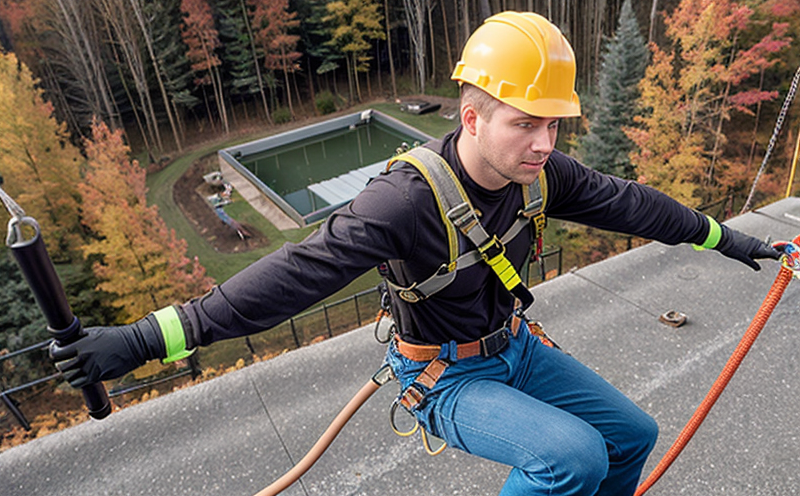ANSI Z359.6 Connector Gate Performance Testing
The ANSI Z359.6 standard provides a comprehensive framework for testing connector gate performance in fall protection and harness systems, ensuring that these critical safety devices meet stringent reliability and durability requirements.
The connector gate is an essential component of personal fall arrest systems (PFAS), designed to prevent the accidental release of the lifeline or lanyard. This ensures that workers remain safely suspended if they are involved in a fall. The ANSI Z359.6 standard specifically addresses the performance, design, and testing requirements for connector gates used in PFAS.
The testing procedure outlined in ANSI Z359.6 is designed to evaluate the gate's ability to withstand various types of stress, including:
- Load application
- Reversal loading
- Impact loading
- Environmental exposure (such as temperature and humidity)
The test setup involves the use of a specially designed rig that simulates real-world conditions, including dynamic and static loads. The specimen is subjected to repeated cycles of load application and release to assess its durability over time.
Testing also includes an examination of the gate's structural integrity under extreme conditions, such as high-impact forces or prolonged exposure to environmental stressors. This ensures that connector gates remain functional and reliable in even the harshest work environments.
The ANSI Z359.6 standard is critical for ensuring that products meet industry safety standards. By adhering to this standard, manufacturers can demonstrate compliance with regulatory requirements and provide peace of mind to end-users who rely on these systems for their safety.
Regular testing ensures the long-term reliability of connector gates, which is crucial in industries like construction, manufacturing, and maintenance where workers are at risk of falling. This testing helps prevent accidents and saves lives by ensuring that fall protection equipment meets the highest standards of performance and durability.
Why It Matters
The ANSI Z359.6 standard is essential for ensuring the safety and reliability of connector gates in personal fall arrest systems (PFAS). These devices are critical components that prevent accidents by holding workers safely during a fall, reducing the risk of severe injury or death.
Connector gates must be capable of withstanding various types of stress, including dynamic loads from falls, static loads from workers' weight, and environmental conditions such as temperature extremes. The ANSI Z359.6 standard provides a standardized method for testing these properties to ensure that the connector gate can perform reliably under all expected circumstances.
Regular testing of connector gates helps manufacturers identify potential weaknesses in design or manufacturing processes early on. This proactive approach allows companies to make necessary improvements before products reach the market, reducing the risk of failures in real-world use.
The ANSI Z359.6 standard also ensures that all connector gates meet rigorous performance criteria set by industry experts and regulatory bodies. By adhering to this standard, manufacturers can demonstrate their commitment to quality and safety, which is crucial for gaining trust from customers and regulators alike.
Ultimately, the ANSI Z359.6 standard plays a vital role in protecting workers' lives and ensuring that fall protection equipment functions as intended when needed most. Compliance with this standard not only meets legal requirements but also enhances overall safety within high-risk industries.
Why Choose This Test
Choosing ANSI Z359.6 connector gate performance testing is essential for several reasons, particularly in sectors where worker safety and compliance with industry standards are paramount:
- Regulatory Compliance: Meeting the requirements of ANSI Z359.6 ensures that your products comply with relevant regulations governing fall protection equipment.
- Enhanced Safety: By testing connector gates according to this standard, you can ensure they perform reliably under various stress conditions, reducing the risk of accidents and injuries.
- Quality Assurance: Regular testing helps identify potential issues early in the manufacturing process, allowing for timely corrections before products reach end-users.
- Trustworthiness: Demonstrating adherence to industry-leading standards builds trust with customers who rely on your products for their safety.
In sectors like construction and manufacturing, where workers are frequently exposed to falls from heights, the ANSI Z359.6 standard is particularly important. It provides a robust framework for ensuring that connector gates meet the highest standards of performance and durability.
By choosing ANSI Z359.6 connector gate performance testing, you not only enhance your product's safety but also contribute to creating safer working environments for all those who use fall protection equipment.
Quality and Reliability Assurance
- Loading Cycles: The ANSI Z359.6 standard requires connector gates to undergo multiple loading cycles, simulating real-world use scenarios.
- Impact Testing: Gates must be tested for their ability to withstand high-impact forces without failure.
- Environmental Exposure: Connector gates are exposed to various environmental conditions to ensure they remain functional in all expected circumstances.
The testing process is designed to evaluate the connector gate's structural integrity, ensuring it remains reliable and safe under a wide range of operating conditions. This includes static loading tests to assess how well the gate holds when exposed to constant stress over time, as well as dynamic load tests that simulate sudden, high-force impacts.
By adhering to these rigorous testing protocols, manufacturers can demonstrate their commitment to quality and reliability, which is crucial for maintaining trust with customers and regulatory bodies alike. The results of these tests provide valuable feedback on the performance and durability of connector gates, helping to identify areas for improvement and ensuring that products meet or exceed industry standards.
Regular testing also helps manufacturers stay ahead of emerging trends in fall protection technology, allowing them to incorporate new developments into their designs and processes. This proactive approach ensures that your products remain competitive and continue to meet the highest safety standards.





